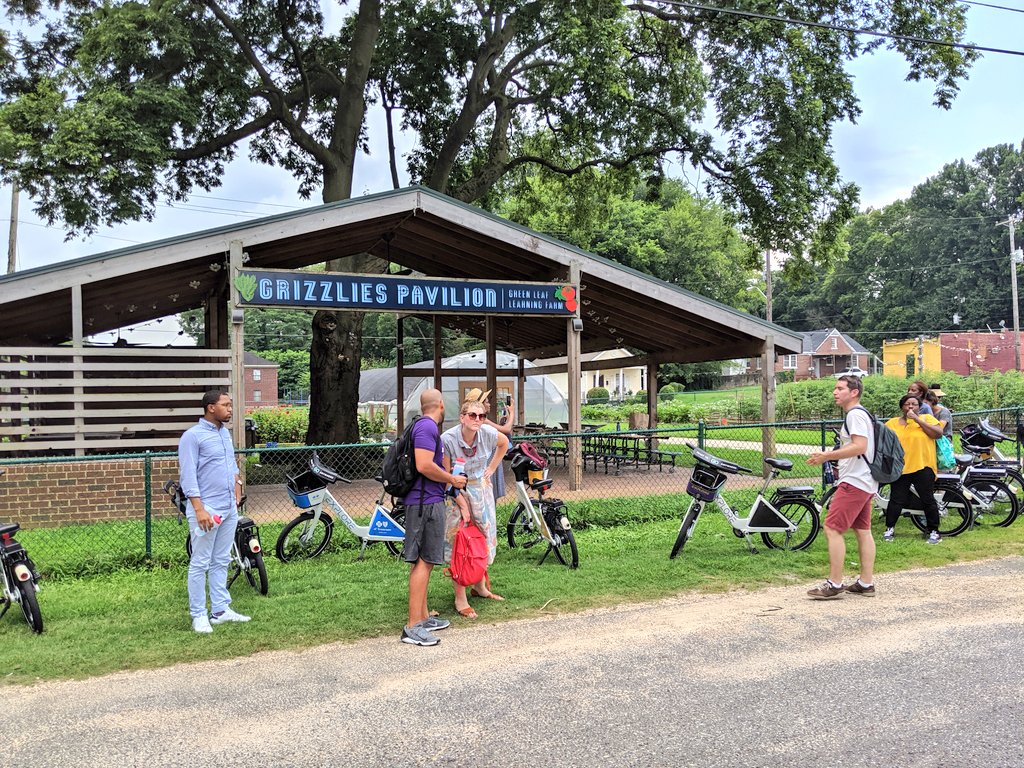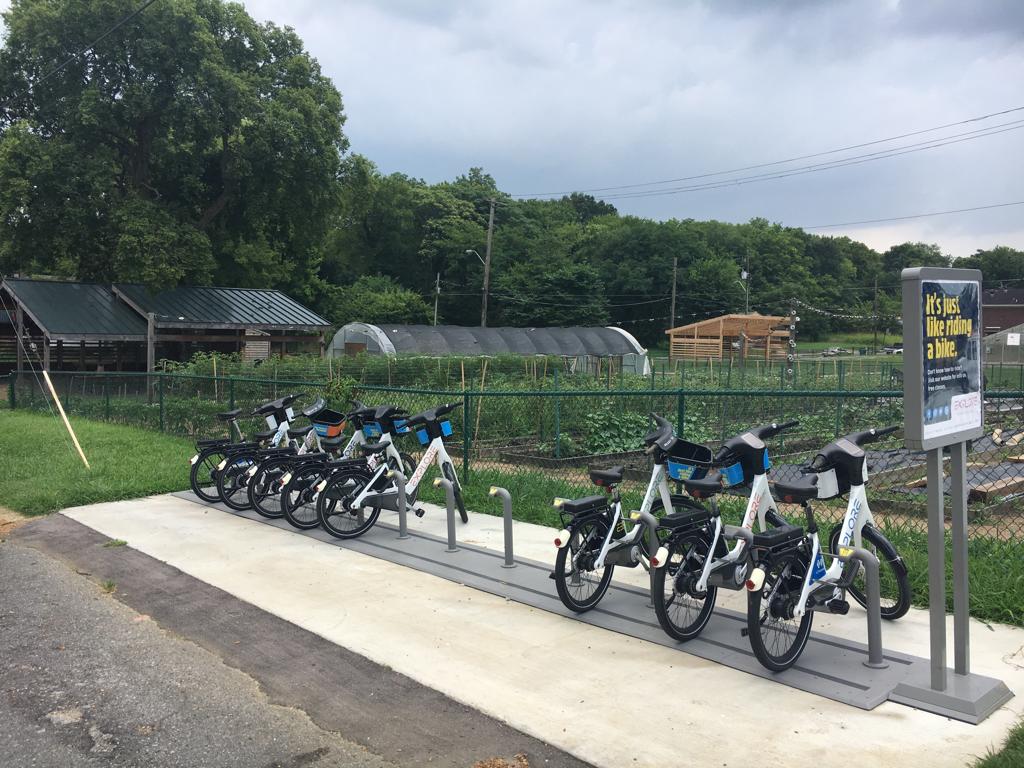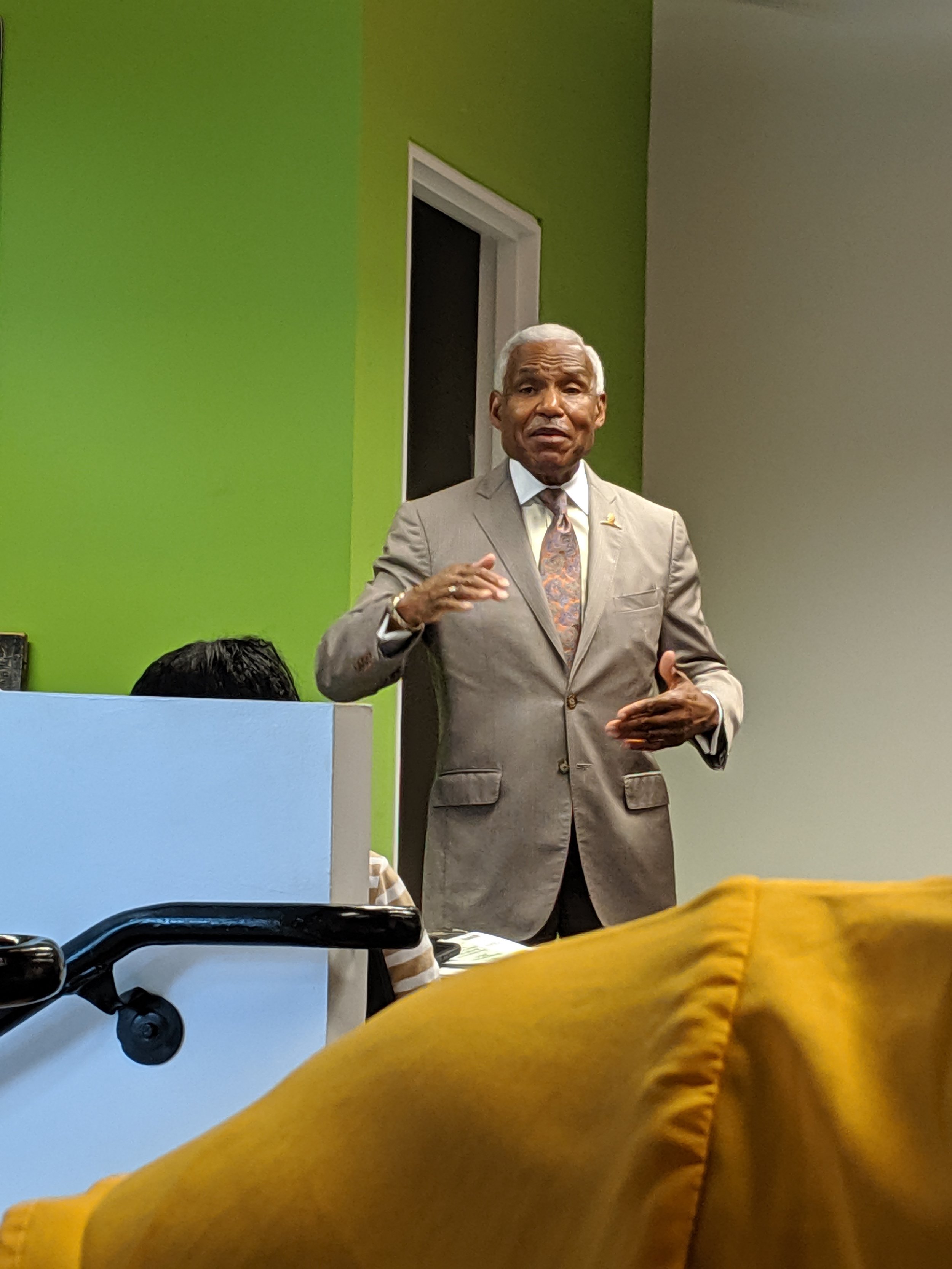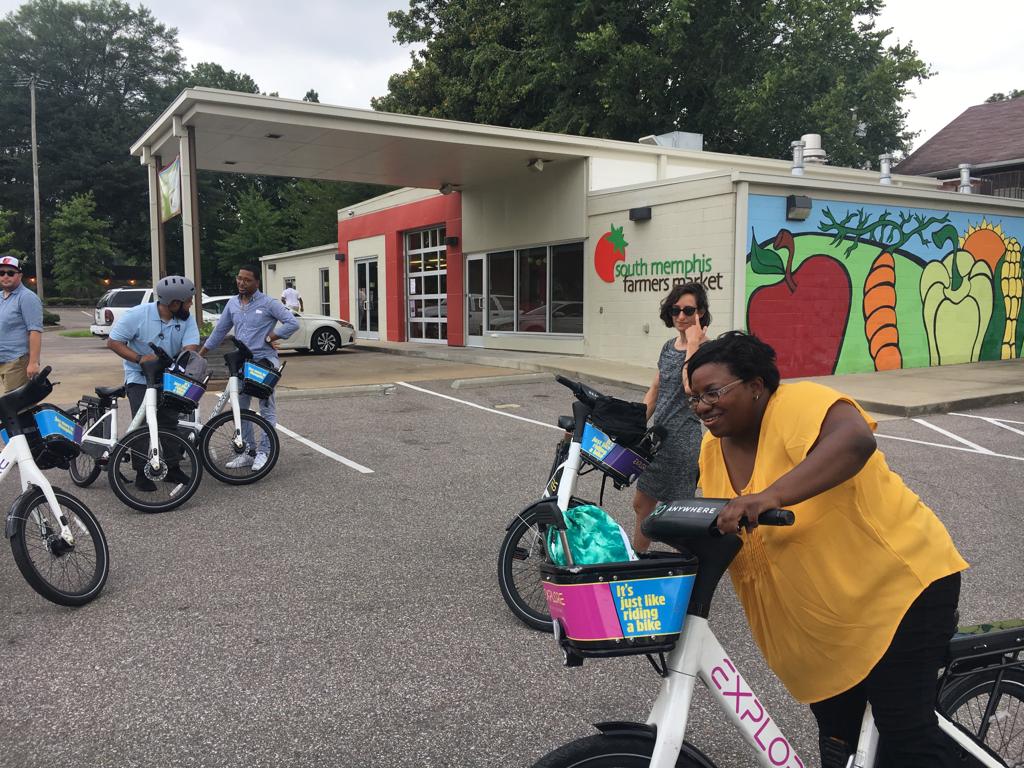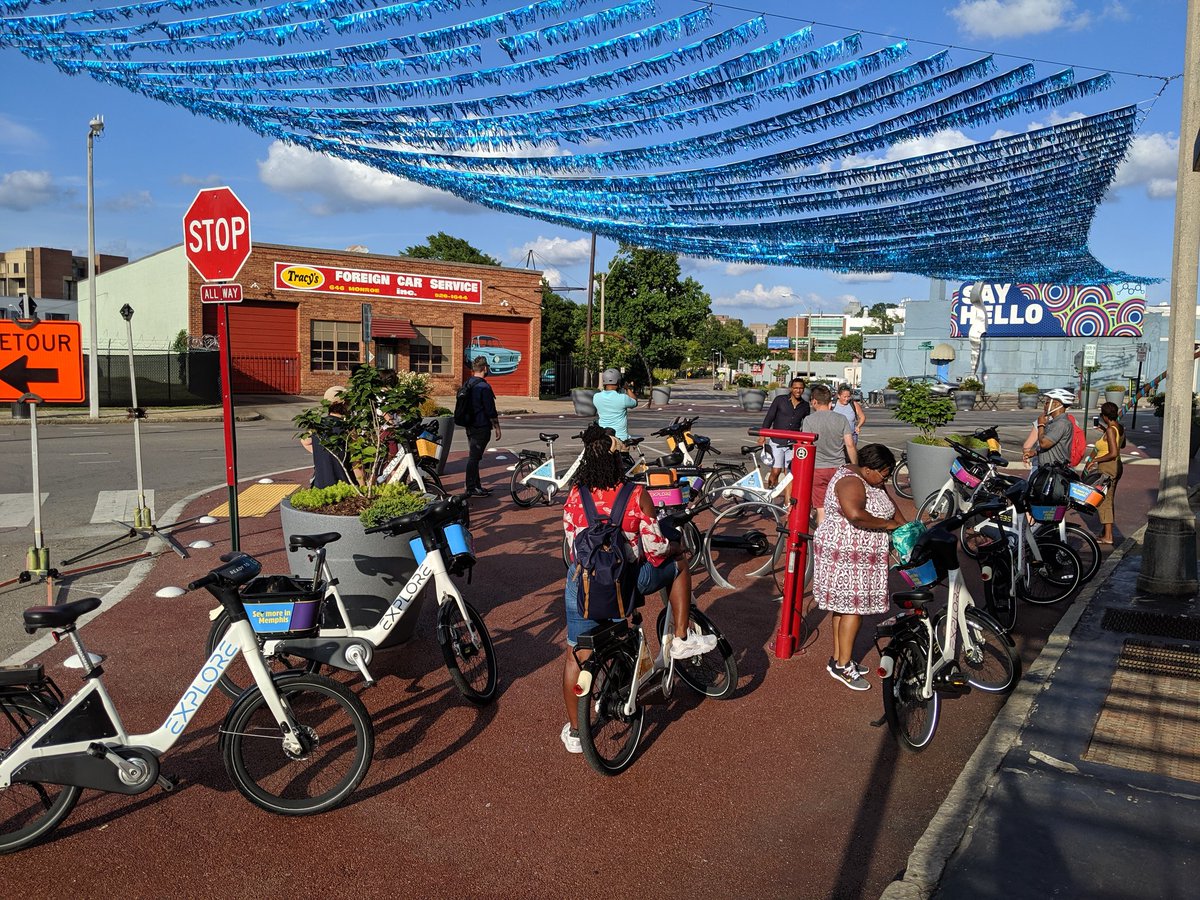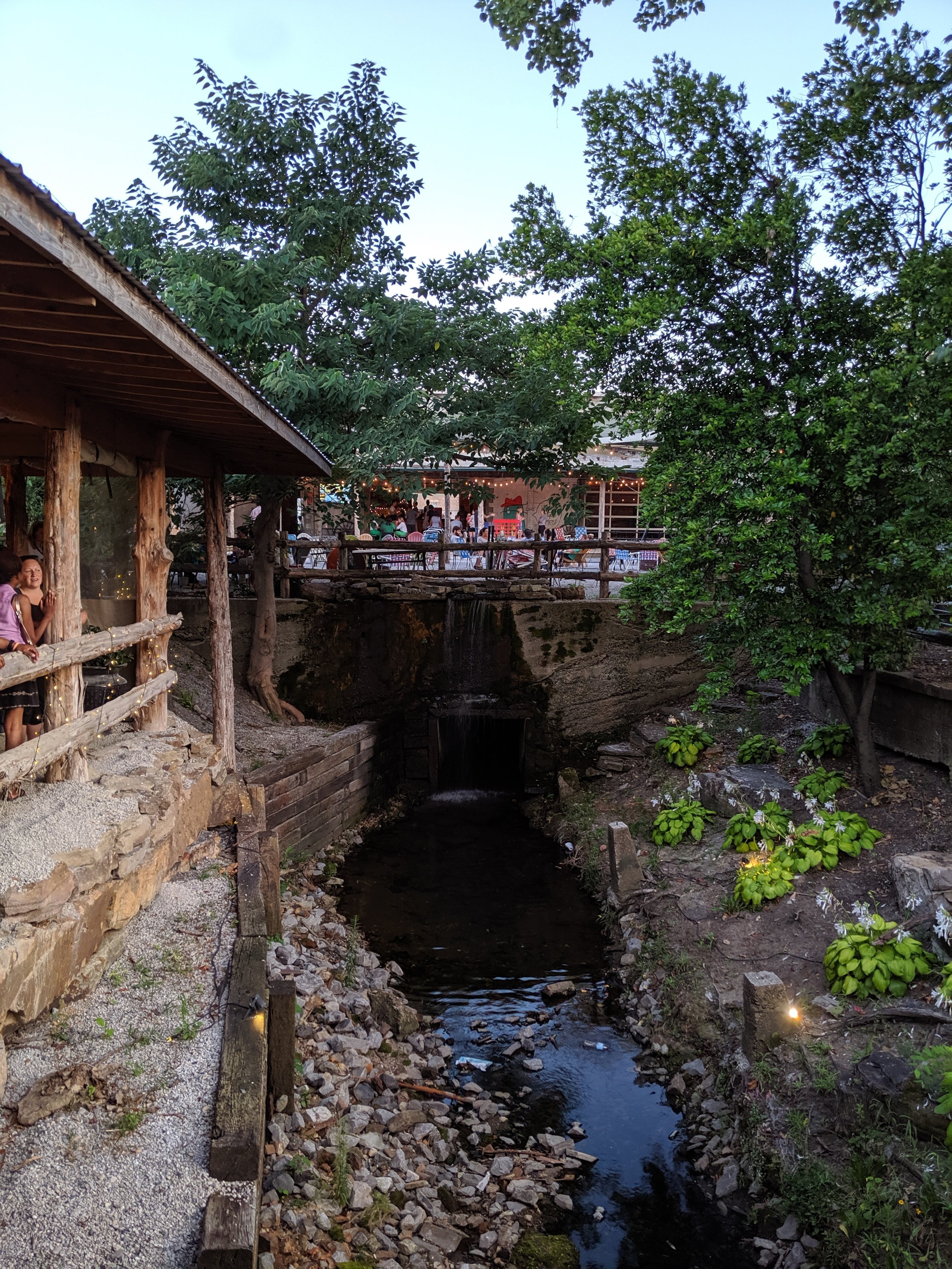Last week Bikemore staff traveled with neighborhood leaders, elected officials, and DOT staff members to Memphis to learn together with PeopleForBikes. This study tour was part of Baltimore’s Big Jump grant from PeopleForBikes.
Our Baltimore delegation consisted of Keshia Allen (Westport Community Association President), Councilman Kristerfer Burnett, Rita Crews (Belair-Edison Community Association President), Fabienne Dorceus (community organizer), Celena Owens (Oliver neighborhood leader), Corey Paige (office of Councilman Dorsey), Ashiah Parker (No Boundaries Coalition/Bikemore Board President), Charles Penny (Baltimore City Department of Transportation), Councilman Leon Pinkett, and Delegate Melissa Wells.
Why Memphis? Memphis has a comparable population to Baltimore, and faces many similar challenges of long term disinvestment, poverty, and historic racism. But it’s also similar in that that are visionary leaders at both the neighborhood and city level striving to do things differently. We intentionally didn’t talk to any bike advocates, but everyone we spoke with shared that mobility was a key component to the success of their vision for Memphis, and they worked to advocate and include improved mobility for people who walk and bike in all their projects.
Here are some of the things we saw, and lessons we’re brining back to Baltimore with us:
First stop: National Civil Rights Museum
To set the context for the trip, the first stop we made was at the National Civil Rights Museum at the Lorraine Hotel, where Martin Luther King Jr. was assassinated. We were reminded of the role transportation played in both giving activists a platform, as well as how those with power used restricting access to public space for protests as a form of control to advance racism.
South Memphis bike tour of their Big Jump and a learning farm
We rode bike share bikes and visited Green Leaf Learning Farm at Knowledge Quest, which will be piloting local grown produce delivered locally by paid youth on cargo bikes. Knowledge Quest runs a learning farm and various youth and family programs. When Director Marlon Foster spoke with us, he emphasized being thoughtful about being invited into spaces vs. inserting themselves, as well as creatively using a single highly recognizable paint color to mark the spaces they use and are developing in the neighborhood.
On mobility and leadership from a former mayor and an affordable housing developer
Former Mayor A C Wharton, Jr. shared how he stuck to his instincts and committed to building bike infrastructure because he understood the related economic, health, and community benefits that would result in better connectivity. There were a lot of people who questioned his leadership, but by having a clear vision and supporting his staff to carry it out, that vision became reality.
Roshun Austin, President/CEO of The Works Community Development Corporation, shared the innovative housing and lending programs they run to provide affordable housing and provide new sustainable pathways to home ownership. Roshun didn’t learn how to ride a bike before she started partnering with PeopleForBikes, but they now lead regular rides as a key component of their community work. They also run the South Memphis Farmers Market, setting up creative partnerships with local farms and grocers to make it financially possible to access local food.
Making a park surrounded by highways accessible
Executive Director Tina Sullivan took us on a tour of Overton Park, which much like many parks in Baltimore, is struggling from being surrounded by wide streets that serve as highways on three sides. By creating artistic gateways and connecting entrances with planned bike paths, and being intentional about where in the park to create activation with things like playgrounds and dog parks, they are making real strides in inviting more neighbors into the park. Future plans include high-visibility crossings tied with further traffic-calming in addition to direct connections to separated bike paths.
A former Sears warehouse turned into a mixed use vertical development
Porsche Stevens from Cross Town Concourse and Crosstown Arts took us on on a tour of the mixed use Cross Town Concourse development, which houses everything from doctors offices to a school to arts organizations to small retail businesses. After the building sat vacant for years, it took 30 funding sources and commitment of nearly 40 founding tenants to get the project off the ground. She talked about how small things like the choice of music in the space has the ability to make various people feel welcome and invited into the space. We visited their state-of-the-art theatre space, and talked about the dignity and pride in bringing the best of the best resources to a historically disinvested neighborhood.
Placemaking in a medical district
In a creative partnership between the city and Memphis Medical District Collaborative, a five lane road was narrowed to three lanes. They installed quick build artistic crosswalks, bike lanes protected with flex posts, and planters to reduce crossing distances and slow traffic. The City paid for basic markings and resurfacing and the Medical District Collaborative paid for all of the extras: delineators, planters, and art.
Public art in an automotive district
In the Edge District we checked out a a traffic calming and placemaking road diet at a previously dangerous intersection. It reclaimed part of the road at a confusing intersection though installation of planters, tables and chairs, a bike fix-it station, and bike parking — and put an artistic, movement-filled shade structure above it.
Beautiful and busy public space and a day-lighted stream
We checked out Loflin Yard, a restaurant featuring an outdoor space that felt a lot like a friend’s backyard, that was filled with people playing games and relaxing, and featured a beautiful view of a stream, one of the only parts of the waterway that is not contained into a drainage pipe.
We learned a lot from this trip. We learned (or were reminded!) that change is possible, but it takes times and visionary leadership to do it well. Many of the projects we saw started 10 years ago and were just being built, but we saw that they are possible in Memphis and they’re possible in Baltimore.
And we were reminded that we need to ride bikes and have more fun together. One of the most valuable parts of the trip was the informal time we spent walking, biking, eating and just hanging out together, when we got to know each other as people. When leaders from different neighborhoods shared their stories, when elected officials and advocates shared their challenges and resources, we were reminded that together we are much stronger, and that we have the knowledge and vision within Baltimore to create the change we want.
Many thanks to PeopleForBikes for providing this amazing experience, and to the Baltimore delegation that saw the value in taking the time out of their busy lives to learn with us. We collectively came up with lots of ideas for continuing this energy in Baltimore — so stay tuned!







